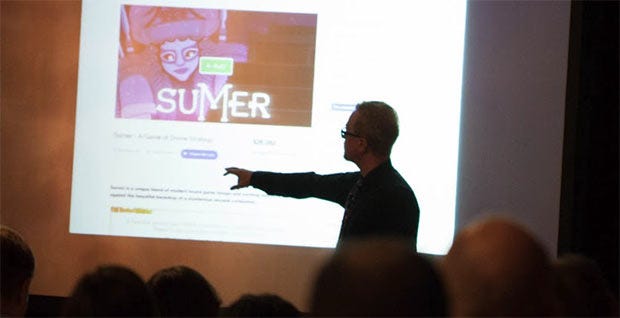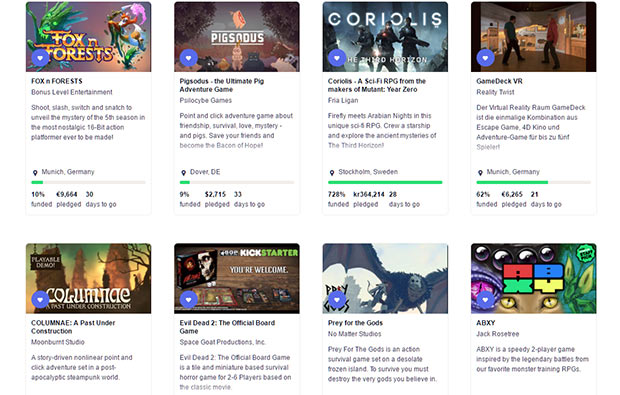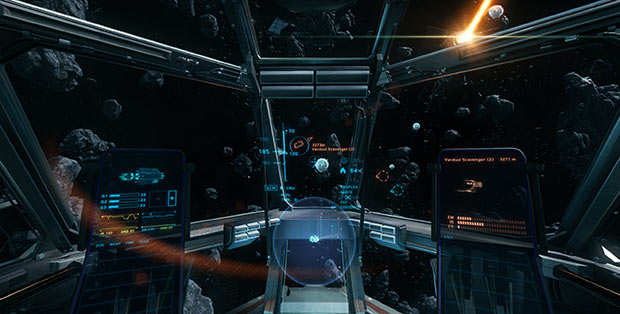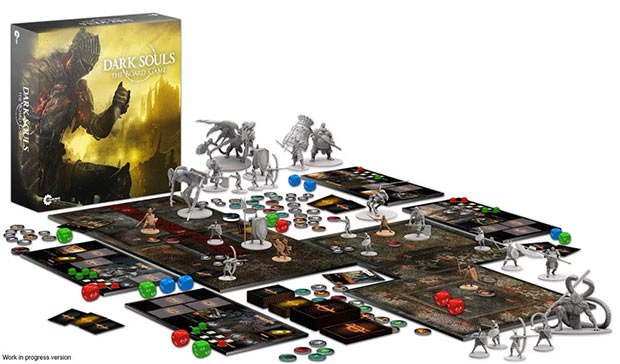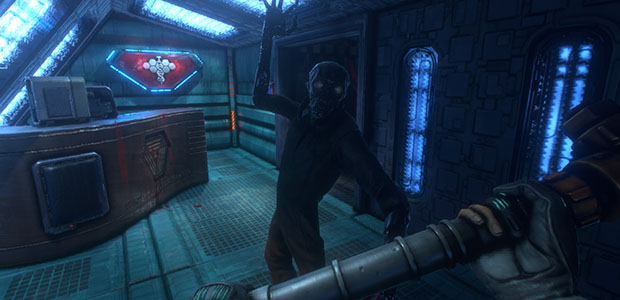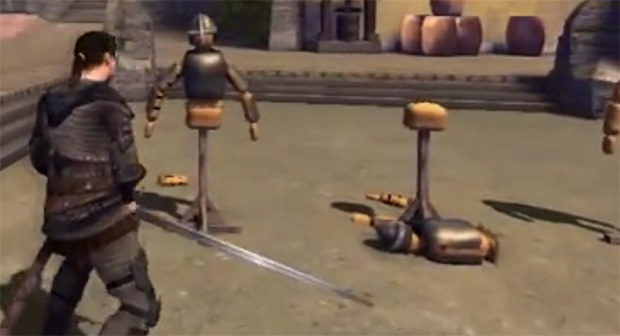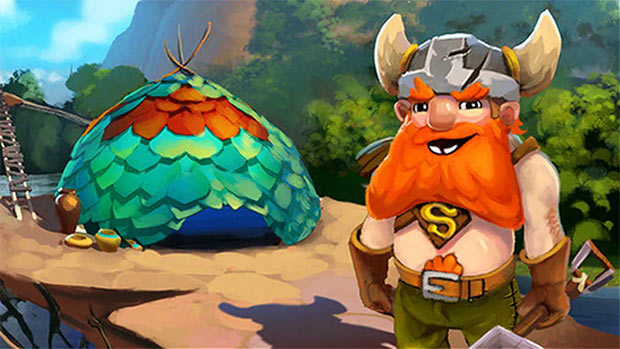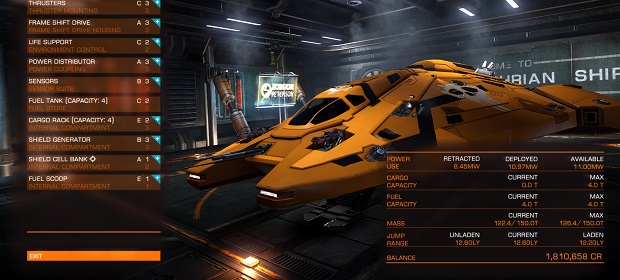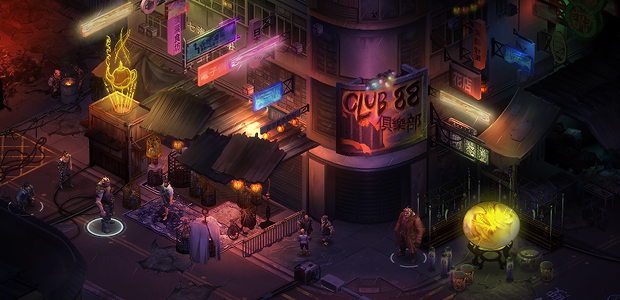Kickstarter's Head Of Games: "Kickstarter Fatigue Only Lasts Until Someone Sees Their Favourite Game Pop Up"
The state of games on Kickstarter in 2016
At this year's Develop conference in Brighton, I grabbed an hour with keynote speaker Luke Crane, Head of Games at Kickstarter, to talk about the state of play of videogames on the crowdfunding platform in 2016. Discussed: what makes a good project now, the odds of making it, 'Kickstarter fatigue' and the question of glory days, Kickstarter's reaction to funded projects that are not then released, the importance of community, how the press can be unhelpful and whether or not famous names are dominating the ecosystem at the expense of smaller developers.
RPS: What to your mind is the model of a successful Kickstarter game in 2016?
There are a thousand caveats on top of anything I might say here, but for me there's no one right way to be successful on Kickstarter. You're always serving a community. Sometimes it's your community, sometimes it's a community you haven't met yet, and so you're having to reorient to be successful on their terms. My favourite example of late is a game out of a team in New York city, called Sumer. Small game, few hundred backers, about 25,000 dollars, and they clearly put so much love and care and sweat into this game, and they had a very, very functional prototype. I played it, it's great. Then they wanted to take it to networked play, and that was their goal for the kickstarter. Get enough money to pay one of their engineers to live while he networked the game. Great! A modest goal for a super-cool, albeit very weird, game. A team that cared, with a goal that was tangible and understandable.
The goal that I don't like, and I understand why it's so difficult, is the "we're going to make a vertical slice of the game and then take it on for investment." Urgh. That's a really tough sell. Your backers want to feel like they're part of the process of creating and finishing the game. They don't want to feel like that they're part of the process of you making something that you're then going to take out into the world and kind of wave goodbye to them. Even though that's how games are made, and especially that's how small games on Kickstarter become big games, is they maybe do a thing on Kickstarter with maybe an unreasonable goal, and then they need more funding so they go and take it out, and a publisher gets involved... It's a different story, and it's so much about the narrative, the story on Kickstarter.
RPS: In that instance of Sumer, if they'd arrived with nothing made but a bunch of nice concept art and a fun pitch, could that have worked in 2016?
I think so. Maybe with a more modest goal. Who knows, maybe that would have been more compelling, even? "We need your help to create and finish this game, we want you to be on board." There's a subset of videogame fans on Kickstarter who find that very compelling, to be a part of the process, where they're not just getting a finished game, but they'll be part of an alpha or something along those lines. There are people that want that experience. Maybe they would have been more successful, they could have had people more willing to help.
I think the greater story around them is, y'know, cool concept, I think excellent implementation, but that doesn't matter on a Kickstarter because people aren't really playing the game on the Kickstarter page. But they're just a small team with little means. They're so buried in development that they had a hard time doing community-building and outreach, and honestly the only reason they were successful at all is that they did decide to turn one of the team members into that role.
It wasn't an easy process, it was a process full of heartbreak and tooth-gnashing, but eventually one of the team members said "someone's gotta do this, so I will." He's the gentleman that I worked with for the better part of a year, and that's the vital element that I feel is missing from a lot of Kickstarters that wander on is that they might have a super cool project, but they haven't done any outreach. Some aren't even willing to do any outreach, to get out there and talk to people in the community, or even talk to me or my co-workers.
RPS: How much does this necessitate having the budget or resources for marketing in the first place? Some people surely just don't have the means.
I don't know what the marketing budget is for a tiny indie game in 2016, but the reality of 2016, and honestly this has been the reality since I started making games in 2002, is that you don't have the luxury of not doing this. It's not an additional expense. If you want to make games to play on your home computer to play by yourself, then you don't need to think about these things. If you would like a game to reach an audience, then you have to have a small number of skills, and one of those skills is outreach. Pitching is another. Pitching is the worst, it's the worst thing in the world, but if you want to get a publisher, you're probably going to have to pitch. Especially if you're making a game that's weird and different. Coping with the community not understanding it, publishers not understanding it, and just general marketing, being able to describe your game in two short sentences. I'm sure you know that is not a skill that many people have, but that is the reality in 2016. As a small indie creator, these are necessary skills.
RPS: That example you mentioned, of Sumer trying to achieve a specific thing rather than create the whole game, is that kind of thing on the rise?
Not really. It's something that we actually encourage, and push people to do. A tangible, achievable goal is so powerful on Kickstarter. A game, done, is a tangible, achievable goal, but even to break that down a bit farther and say 'we want to develop this last part of the game'. Especially if you are a team of small means, it helps you start building that community and gives people an understanding of where you are in the process, and what you want done. And it shows them that maybe you actually know what you're talking about instead of "GAME! COOL ART! GAAAAAME!"
RPS: You mentioned guys who hang around the Kickstarter front page looking for projects to back - what proportion of videogame backers do they represent?
[Long pause] How do I say this? The main source of backers for a small team is probably the people that you've driven to the project - your friends, your family, your community. But when you launch on Kickstarter, you will see people that you don't recognise, people that you've never met, and you will see that portion of your project's funding grow. In games, 20-30% of your funding is going to come from us, from people searching Kickstarter for games, digging through the categories and whatnot. Sometimes that's not enough to push you over your goal, but it's a very significant boost to what you're bringing to the project.
RPS: Surely that's very dependent on how visible you are on the front page? And no doubt there are very complex algorithms which dictate where you appear.
I cannot overstate enough the importance of making sure you have that initial interest in your project when you launch. We give every project equal footing when it launches. No project is buried or anything like that, but basically every project goes through the Just Launched stream, so you get to see the complete mix of everything that's coming up, which is super-cool. But after that point, having activity on your project, having people backing and commenting, and posting updates yourself... This counts for a lot. And you don't have to fund instantly, that's not what I'm saying. Just having a fair amount of interest or activity makes a difference.
RPS: I imagine it gives Kickstarter a bad image if the front page was filled with projects that were obviously not going to make it?
Right, there are certain considerations that we take into account. You can search for those projects though, you can look at projects which are in dire straits.
RPS: Can someone realistically turn their Kickstarter around at that point? Does it happen?
Yeah. So, we had this metric, it's really weird and kind of a not-great metric, but basically if you can hit 30% of your funding goal within a reasonable time, that dramatically increases your chance of success, up to like 80%. Obviously if you hit 30% of your funding goal in the last twelve hours of your project, there's still a pretty big risk that you're not going to fund. It's actually kind of stupidly simple: if you can hit 30% of your funding goal with 70% of the project duration to go, you have a really good chance of being successful. There's not much more to it than that. You kind of just want to creep up towards your goal, because good lord not every project funds on the first day. Tons of huge projects have not funded on the first day - System Shock did not fund on the first day, Elite Dangerous did not fund on the first day. It's OK, everybody!
I get really disappointed, I see it in the press too, if something doesn't fund in the first day or the second day then they won't cover it, or it's seen as a failure. It's just not true.
RPS: Sometimes the press gets blamed for a project not succeeding, or someone writes to us saying they depend on our coverage to keep the lights on. It's a horrible situation, even if that were the criteria we used to decide what to cover, there's no way we could guarantee it'll work.
Right, I'm behind the scenes and I can't guarantee it. I cannot make a project successful. I think that's ok, I'm perfectly comfortable with that. It makes me sad when projects that I like don't fund, and I feel badly for the teams, but there's also a really healthy sorting that's happening on Kickstarter. You get funded for a reason. You don't get funded because I waved a magic wand.
RPS: You've said that 20% of videogame Kickstarters now succeed. What portion of that is games from a famous name or established brand?
I don't know, but you're talking about a dozen or a few dozen of those at the most, and there are dozens of games that have been funded, so there's not that many.
RPS: They must have a big share of the cash pot, though.
Number of projects small, number of dollars collected, large. It's a fair chunk of the videogame funding total, but I don't even think it's the majority. It's probably a significant minority - you know, Jordan Wiseman's projects, Brian Fargo's projects, Bloodstained or Shenmue.
RPS: What is the internal feeling at Kickstarter about how these already familiar projects, often from old men of the industry, seem to be guaranteed success and garner so much more coverage? Is that at the expense of smaller ones?
Come on. I guess you have to make your choice about whether you're covering the old man or the young man. Internally, what we see is that those big projects tend to attract new backers and those backers tend to back more projects. So we actually see a lift for the system. There's no evidence of a negative drag from those projects. It does create a perception in the press and in the public that Kickstarter is only for blockbusters, but that is demonstrably false. Hundreds of mid-tier and smaller videogames have been funded. The big projects gain at lot of interest and a lot of attention, but it's real counter-intuitive, cos it seems like that's taking all the air out of the room, but what we see is that the new backers go on and back more projects. It's not what it looks like.
RPS: There's also this perception that some developers go to Kickstarter when they don't need to, like Shenmue 3 or Harebrained going back repeatedly; how much do you agree with the argument that the spirit of Kickstarter should be to help plucky young indies?
The platform's really robust and broad. There's a lot of room on the platform. You can also point to March 2012 and say, well, if Schafer doesn't launch Doublefine, does Hyper Light Drifter get made the next year? Probably not. I think that having a mix of veterans, experienced indies and smaller teams who are starry-eyed, I think it's healthy. I would also dispute the idea that Jordan (Wiseman, of Harebrained Schemes) didn't need Kickstarter at point. It shows what little we know about running a studio, or how cash flow works at their studio. I've since become friends with their studio head, Mitch, who's just a miracle worker. He actually runs those Kickstarters to keep the studio humming, to keep everyone going directly from one project to the next, so that there's no down-time, and there are no terrible fates like we hear about in the games world. It's remarkable. He sees the value in, essentially, keeping a small business running with those infusions of cash. In other periods, the sales float them and get them through there. It's just a more complex ecology than I think we understand. Also, videogames are so expensive to make now. Holy God! [Laughs]
RPS: Shenmue's a different situation - this was really getting the public to take the risk for them, for a project which could almost certainly have gotten private funding.
As I understand it, it really wasn't Sony. I talked to the team a lot, and they really needed to prove to themselves that it could be done. From Yu Suzuki to fans, it was "do you want me to make this?", and they needed a yes obviously, and only then does Sony come in and say "OK." Of course Sony was in on the early conversations, but their part in them was "sounds good, but we don't know."
RPS: Could an online petition have gotten their attention the same way?
That I don't know. We can only speculate.
RPS: Though only 20% of videogame Kickstarters work out, 50% of boardgame ones do. What's the reason for that disparity?
54%, actually. There's a number of factors, but the main one is community, for boardgames. Tabletop backers are incredibly dedicated, and they keep coming to support these projects. Not only that, but they're very vocal on Kickstarter, and for good and for ill they're very vocal off of Kickstarter. They will go to Reddit or boardgamegeek.com or other forums and talk about what's going on on Kickstarter. That's really important for keeping conversation going. It's not just a creator shouting "hey, I launched a project over here!". There's constant conversation. People are very discerning about what they want, and they're willing to talk about it in project.
RPS: I wonder to what extent that's a question of scale. Videogames are so huge now, even to the point of full-blown culture war around them, but perhaps the smaller number of boardgame fans means they can have a more unified community?
Well, I can tell you that it looks like that from afar, but being inside that world it is just the same. The culture wars in tabletop games are just as bloody, but they're smaller. But the smaller the stakes, the bloodier it tends to get. There's also no other place where this many boardgames and this variety of tabletop games are being created. In 2016, for a digital game, you have a lot of different outlets, and a lot of them make it really easy for you to acquire a game and take it with you wherever you go. I think that splits a lot of attention, but as far as I understand there's nothing like that for boardgames, aside from Kickstarter.
RPS: To what extent have Patreon, Greenlight and Early Access stolen Kickstarter's thunder?
I think Patreon is a separate model, very much so. I don't really see them as competition. I think Early Access, yeah, it does occupy the same space as Kickstarter, collecting funds for that game before it launches. Understandably it has a lot of appeal, because it gets added to your Steam account, it becomes part of your PC experience at that point, so I get it. That's pretty attractive. And then you have Humble and GoG and itch.io - there's a lot going on.
RPS: Sometimes you do get demos on Kickstarter though, as with System Shock, which seemed to be great promotion for it. Should there be more demos? They're not exactly easy to make that early in the process.
I don't know. Jesse Schell said that he looked into this at one point, I saw him present a study on games with trailers and demos, and he said that the games with the most successful launches only displayed trailers. The least successful launches, actually, were offering demos.
RPS: The impossible CGI dream versus the crushing normality of the real...
[laughs] Right. But I wonder if that has held on Kickstarter, or whether the worm has turned and having a demo is something that's important. I tell creators to thread the needle on that one. Have your trailer and animations or whatever you can do, and then have gameplay footage. Let people know what it is they're getting into. But don't necessarily offer them a demo. And you're right, a demo is a huge commitment, it's a lot of work, and I understand Jesse's logic in this, you're scratching people's itch. They might be "that's enough, I don't want to play another level of that game."
RPS: There seems to remain this confusion in some people's minds about whether they're buying a game or backing a potential game. What are you guys doing to try and clear that up?
Yeah. It is a concern of ours, and something we're always adjusting our internal to external messaging about, to try and remind people of the experience we're in for. We've rewritten our terms of service to make it clearer, one of our mantras is "Kickstarter is not a store". [sighs] Personally, it's part of my job to remind people and quiet them down, but I also know that on the other side, while there is that danger as we get bigger that people will just think that it's a store and they're just gonna get the game, there is a hardcore of backers who get it. It could even be a silent majority. I don't have any hard data on that, but even on other media sites that I will not name, even on Kickstarter, backers will come out and defend the process, remind people that they're supporting a team putting something new out in the world, they're not just buying a game.
RPS: People are there because of advertising, though. They see the pitch videos and it's not that different from a TV or YouTube ad. We are aspirational organisms, and no matter how much people know better, they feel that complete belief that this is the thing they really need, and that's how many Kickstarters are essentially presented.
It's true. It's difficult. It's one of the reasons why I'm always encouraging teams to be as open and honest as possible, and also to put themselves into the project. There's a certain language to Kickstarter projects, it's almost a joke now in wider culture, about the earnest or even twee team putting their idea out there. I actually think it's OK, I really do. I think that having that language and that expectation that it isn't just a cool product shot and some treacly music, but that there are people behind it and this is who they are. Having that as part of what a Kickstarter is important.
RPS: I know there is a no legal requirement for a Kickstarted projected to be completed, but when you get something like a Clang or a Yogventures not getting made, to what extent does that cause internal shocks at Kickstarter?
Well, internally we know the risks and we are comfortable with the model. When we redid our terms of service, discussing failure was part of it. That said, it pains me, it certainly pains my press colleague as we get hammered. We have to set about repairing our good name, essentially, repairing public perception that it is part of the system, and it's terrible and it's not something that anyone wants to happen, but it is part of the risk in funding a project like this. It's tough, because in another world that would have been publishers' money.
It happens all the time, or at least a lot more than we see, when a publisher's funding a project that goes silent or something like that, whereas with a Kickstarter when you're excited up front and really invested in seeing this game made, even if you're only in for $25, and then something happens. You're out your money, you didn't get your game... It's an emotional process, and it's terrible. We kind of have to take a step back and start from one again in explaining how the model works. Most people get it. Even people on failed projects.
RPS: What checks and balances come in from your end when a new project gets a fire under it, given that there is a risk to your good name?
Well, we do a lot of vetting, and by vetting I mean talking to someone like a human being from the get-go. I have to say that the vast majority of people who come to Kickstarter in games are very honest and very upfront. Not universally, no, but I am a curmudgeonly old creature and it warms my heart with how much trust and optimism works through this system. When it doesn't, we have an integrity team that is constantly watching behind the scenes, watching for user behaviour that is suspicious.
If they find anything, I usually consult with them, and we talk about what's going on with the project, who the creators are and I give them background, then we make a decision about what to do. If we feel like a project is fraudulent then we will cancel it. Fortunately this hasn't happened in games yet, but there was a rather large technology project on the site last year, and through that process with the tech team, they were not confident that project was going to deliver, so they cancelled it. It had raised quite a bit of money and they cancelled it last-minute.
RPS: If a Kickstarted game had not ultimately come out, and it was apparently due to mismanagement or external factors rather than proven dodginess, would you let them come back onto the site with another project?
Uh. [Long pause.] We're very forgiving. Uh. There are only a few things that get you banned or banished from the realm. If somebody obviously is fraudulent, that is one of the things. You're done, and we will do everything in our power to stop your sock puppets and your other accounts, and your friends, and people that you hire. We will and we have deflected those people.
But somebody who's failed? Somebody who actually made a good try... let's say they collected money and they couldn't do it, then they came back and wanted to launch another project, I try to talk to those people and make sure that their head's in the right space, but I'm actually comfortable with them coming back and trying again. Failure's a great teacher, and if somebody's willing to humble themselves before that and work through it, that's good. There were a couple of runs in 2012 and 2013 where there were some individuals launching new projects before they had fulfilled the first one, like very rapidly, within a few months of one another, and some of them I wish I had caught ahead of time.
But also I so, so much rely on the backing community, I rely on you all to tell me and talk to us about what's going on. I also rely on you not to fuckin' back a project if you think it's dodgy. Seriously, that's the thing about the model is that it's up for public debate about whether something should be funded. Don't get mad and back a project, like "this is clearly fraudulent, I'm going to back it to watch it", don't do that, talk to me and we'll talk about it.
There's that side, but there's another side to this too. I had a project recently where the backing community was very vocally opposed to it funding, they were questioning me about it, sending me messages about it. I had looked over it, and I can't vet things 100% from a legal standpoint, that's not my job, but I talk to teams, I look at what's going on behind the scenes, I monitor lots of different conversations, and from my perspective it looked like things were on the up and up. It seemed like they had done due diligence, and maybe they were just getting pasted on Reddit, or someone got spooked. That's also my job, to moderate the mob mentality sometimes and say "this one I think is OK?"
RPS: Is there anything Kickstarter might seek to learn from projects like Star Citizen and Elite Dangerous which have gone on to run their own ongoing crowdfunding after the Kickstarter completes?
We're always examining the model and comparing it to what's going on in the world. We're constantly tweaking the product with lots of little features and what not, but in terms of the core all-or-nothing model, we're very comfortable with it right now. I think it's awesome that they've gone on to have success, especially Elite Dangerous, and all the projects which have gone on to be really successful, I really think it's amazing. Especially since we gave them a chance to get a leg up without any strings attached. We're not taking a percentage in perpetuity or something like that.
RPS: Definitely no interest in setting up anything that runs after a Kickstarter has completed, then?
We are such a giving platform. We changed the way the product looks when it ends now, so developers can add a link off to their own site where they can continue funding, or do whatever they want with that link. It is an immeasurably generous gesture from us, but it shows our confidence in the narrative of the all or nothing funding model. Trust me, we're always reassessing things internally, but right now we're holding steady.
RPS: What's your reaction to the term "Kickstarter fatigue?"
I think Kickstarter Fatigue only lasts until the person who's saying that sees their favourite game pop up on Kickstarter. Then they freak out allcaps on Reddit and go back it. That has been my experience. It just comes in waves. Honestly, if you don't want to back a project on Kickstarter, or one of your readers doesn't, that's OK. That's part of the model. Ascribing your own behaviour to some kind of cultural trend or trying to give it a catchy phrase, that is not part of the model. Not everyone who backs a project on Kickstarter stays around. On games a lot of people stay around to back a project. Not all of them, and the ones who do don't stay forever and that's OK, but we do get new sign-ups every day, lots of them, new backers coming in through new projects or just because they've heard of Kickstarter.
Also the games ecosystem is so vast and Kickstarter is such a small part of it, I feel like there's so much more we could do, so the idea that Kickstarter is over or there's fatigue or whatever, honestly, I just feel like it's a lull period or whatever, and we'll be off again on some new adventure soon.
RPS: Is there any sense of there being glory days to return to?
No, I mean our glory days were last year - it was our biggest year. I believe it's a slow undulation upwards, there's a lot of room to grow, a lot of potential. Maybe I'll be wrong, but I don't think so. In 2014, another games publication ran a headline that Kickstarter is dead. And then we went on, and, a few short months later, Shadowrun Hong Kong launched, then Crowfall launched, Exploding Kittens, etcetera ecetera.
RPS: Thanks for your time.
Luke Crane photos credit: Develop Conference / Dan Griliopoulos
